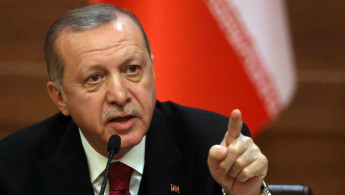Iran, Russia, Turkey to meet again amid Idlib 'humanitarian catastrophe' fears
President Recep Tayyip Erdogan will travel to Iran to meet with his Russian and Iranian counterparts, Vladimir Putin and Hassan Rouhani, state-run TRT Haber television said.
Turkey initially wanted to meet with leaders from France, Germany and Russia on the same day, to discuss regional issues including the Syrian conflict, Erdogan had indicated earlier.
However, press reports over the last weeks have suggested that such a meeting was increasingly unlikely and was set to be replaced by the latest three-way summit between Iran, Russia and Turkey.
The three powers have been working together to speed up the process of finding a political solution in Syria - where all parties are vying for influence - as part of the Astana peace process which began last year.
Russian-led peace efforts were the cause of derision after all the official Syrian opposition, rebel factions, and the Kurdish delegation boycotted them.
The three leaders have previously held summits in the Russian resort city of Sochi and the Turkish capital Ankara.
Erdogan has previously insisted their meetings and the Astana talks were not an "alternative" to the UN-backed Geneva process to find peace in Syria. However the three leaders are visibly pushing for influence in the region while the West steps back.
Despite the Syria war entering some of its bloodies years since the Astana process took part, the tripartite meetings look set to continue.
But the three leaders had said "the Astana format had been the only effective international initiative that had helped reduce violence across Syria and had contributed to peace and stability in [Syria]".
They added that it had given "impetus to the Geneva process in order to find a lasting political solution to the Syrian conflict" in the statement.
"What is foremost for us is getting results. We must get results. We have no tolerance for delays. People are dying here," Erdogan told reporters after the second summit.
Eight rounds of talks under UN auspices in Geneva have made little headway, with Bashar al-Assad's regime taking little interest.
The three countries have been working together despite playing dominating roles on opposing sides of the civil war.
Moscow and Tehran, meanwhile, support Syrian President Bashar al-Assad's regime, as Ankara calls for his ouster and has given aid to Syrian rebels.
Iran and Russia's intervention in Syria are widely seen as having tipped the balance of the seven-year war in the regime's favour.
Idlib is expected to be a major item on the agenda, with Syrian President Assad setting his sight on capturing the last rebel-held stronghold.
Turkey has warned that a military operation to take Idlib would provoke a "humanitarian catastrophe" with 3.5 million people crammed into the region.
Follow us on Twitter @The_NewArab





 Follow the Middle East's top stories in English at The New Arab on Google News
Follow the Middle East's top stories in English at The New Arab on Google News
![Israeli forces ordered bombed Gaza's Jabalia, ordering residents to leave [Getty]](/sites/default/files/styles/image_330x185/public/2176418030.jpeg?h=a5f2f23a&itok=_YGZaP1z)

